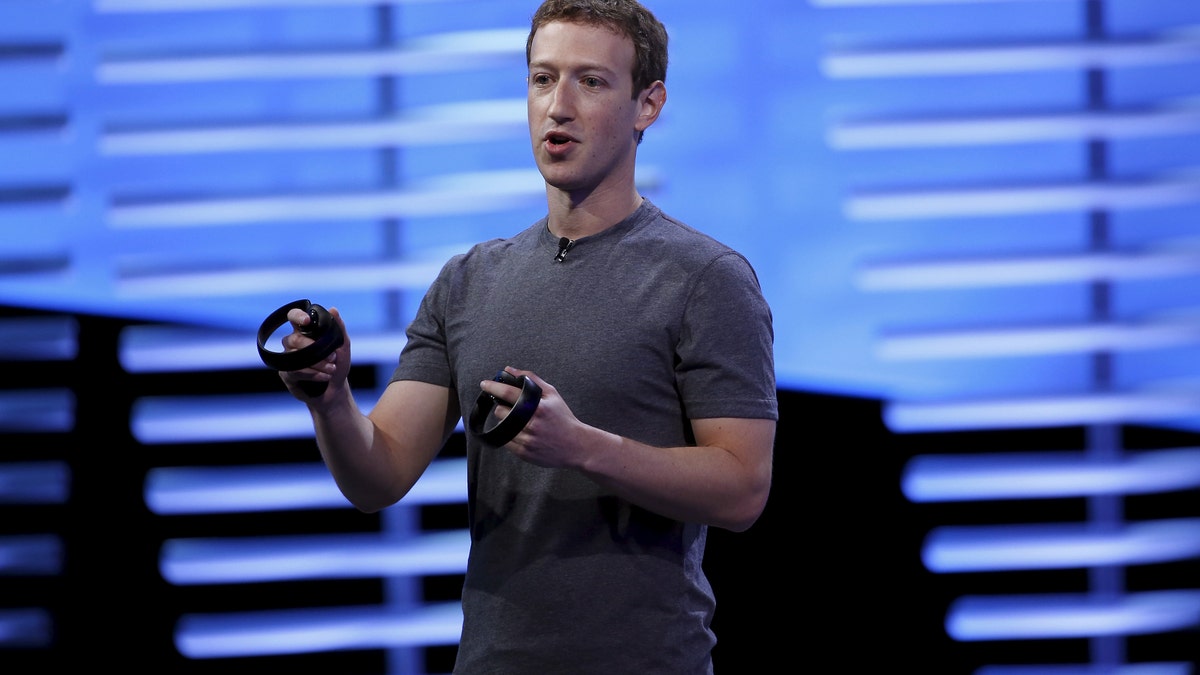
File photo - Facebook CEO Mark Zuckerberg holds a pair of the touch controllers for the Oculus Rift virtual reality headsets on stage during the Facebook F8 conference in San Francisco, California April 12, 2016. (REUTERS/Stephen Lam)
How on earth did fake news become so popular?
I don’t mean the major media stories that some of you find unfair or exaggerated. I’m talking about made-up-stuff being merchandized for clicks and profits. And since such fare spreads like wildfire on Facebook, the social network is under fire for not curbing the crap.
A Buzzfeed analysis found that the 20 top-performing bogus election stories did better on Facebook than the 20 top-performing stories from such legitimate sites as the New York Times, Washington Post, NBC and Huffington Post.
The legit stuff drew 7,367,000 shares, reactions and comments, while the fictional material drew 8,711,000 shares, reactions and comments.
“Of the 20 top-performing false election stories identified in the analysis, all but three were overtly pro-Donald Trump or anti-Hillary Clinton. Two of the biggest false hits were a story claiming Clinton sold weapons to ISIS and a hoax claiming the pope endorsed Trump, which the site removed after publication of this article. The only viral false stories during the final three months that were arguably against Trump’s interests were a false quote from Mike Pence about Michelle Obama, a false report that Ireland was accepting American ‘refugees’ fleeing Trump, and a hoax claiming RuPaul said he was groped by Trump.”
The study found just one uber-popular story from a ultra-partisan left-wing site, which claimed that Ireland was accepting anti-Trump “refugees” from the United States.
Facebook, while using a broader measurement than Buzzfeed, admits it has a problem. And after Google announced this week that it would try to purge such material, Facebook began banning such sites from using its advertising network, trying to starve them financially by removing the profit motive.
Even President Obama got into the act yesterday, offering a 7-minute exposition at a news conference in Berlin on the dangers of fake news:
“If we are not serious about facts and what’s true and what’s not. And particularly in an age of social media where so many people are getting their information in sound bites and snippets off their phones, if we can’t discriminate between serious arguments and propaganda, then we have problems," he said. "Then democracy will break down.”
One admitted purveyor of fake Facebook news, Paul Horner, bragged to the Washington Post that while making $10,000 a month, he had influenced the election:
"Honestly, people are definitely dumber. They just keep passing stuff around. Nobody fact-checks anything anymore — I mean, that’s how Trump got elected …
"My sites were picked up by Trump supporters all the time. I think Trump is in the White House because of me. His followers don’t fact-check anything — they’ll post everything, believe anything.”
Leaving aside the swipe from Horner, who admits he hates Trump, his claim that he influenced the outcome of the election—or any claim that fake news kept Hillary Clinton out of the White House—is ludicrous.
At the same time, this trend is clearly a cancer on the news business. When this garbage pops up in Facebook feeds, people click, and often believe what they see.
The New York Times recently featured other examples:
“Donald J. Trump’s supporters were probably heartened in September, when, according to an article shared nearly a million times on Facebook, the candidate received an endorsement from Pope Francis. Their opinions on Hillary Clinton may have soured even further after reading a Denver Guardian article that also spread widely on Facebook, which reported days before the election that an F.B.I. agent suspected of involvement in leaking Mrs. Clinton’s emails was found dead in an apparent murder-suicide.”
Both utter fiction.
Mark Zuckerberg called the idea that Facebook influenced the election “crazy.” Here is his defense, on his own Facebook page:
“Of all the content on Facebook, more than 99% of what people see is authentic. Only a very small amount is fake news and hoaxes. The hoaxes that do exist are not limited to one partisan view, or even to politics. Overall, this makes it extremely unlikely hoaxes changed the outcome of this election in one direction or the other.
"That said, we don't want any hoaxes on Facebook. Our goal is to show people the content they will find most meaningful, and people want accurate news."
But here’s the problem: Who does Zuckerberg appoint to cleanse his site of fake news? What about stories that are 60 percent false, or 40 percent false? What about those that just make unprovable claims for partisan purposes?
Remember that Zuckerberg had a problem with his trending topics list, which was eliminating conservative stories because of a biased staff. So the Facebook CEO met with a group of leading conservatives and fired the staff, removing a key layer of human oversight.
A similar problem arises with Twitter’s decision this week to shut down a number of accounts belonging to “alt-right” advocates, even if they weren’t being abusive or publishing anything false. What about the company’s commitment to free speech?
Zuckerberg has always maintained the fiction that Facebook is a platform, not a media company, even though it has grown more powerful than most news organizations in distributing journalism around the globe. If it’s just a neutral utility, than anyone should be able to post anything short of death threats and incitement to violence.
But once Zuckerberg admits he’s actually running one of the most powerful media brands on the planet, he has to get more aggressive about promoting real news and weeding out hoaxers and charlatans. The alternative is to watch Facebook’s own credibility decline.




















